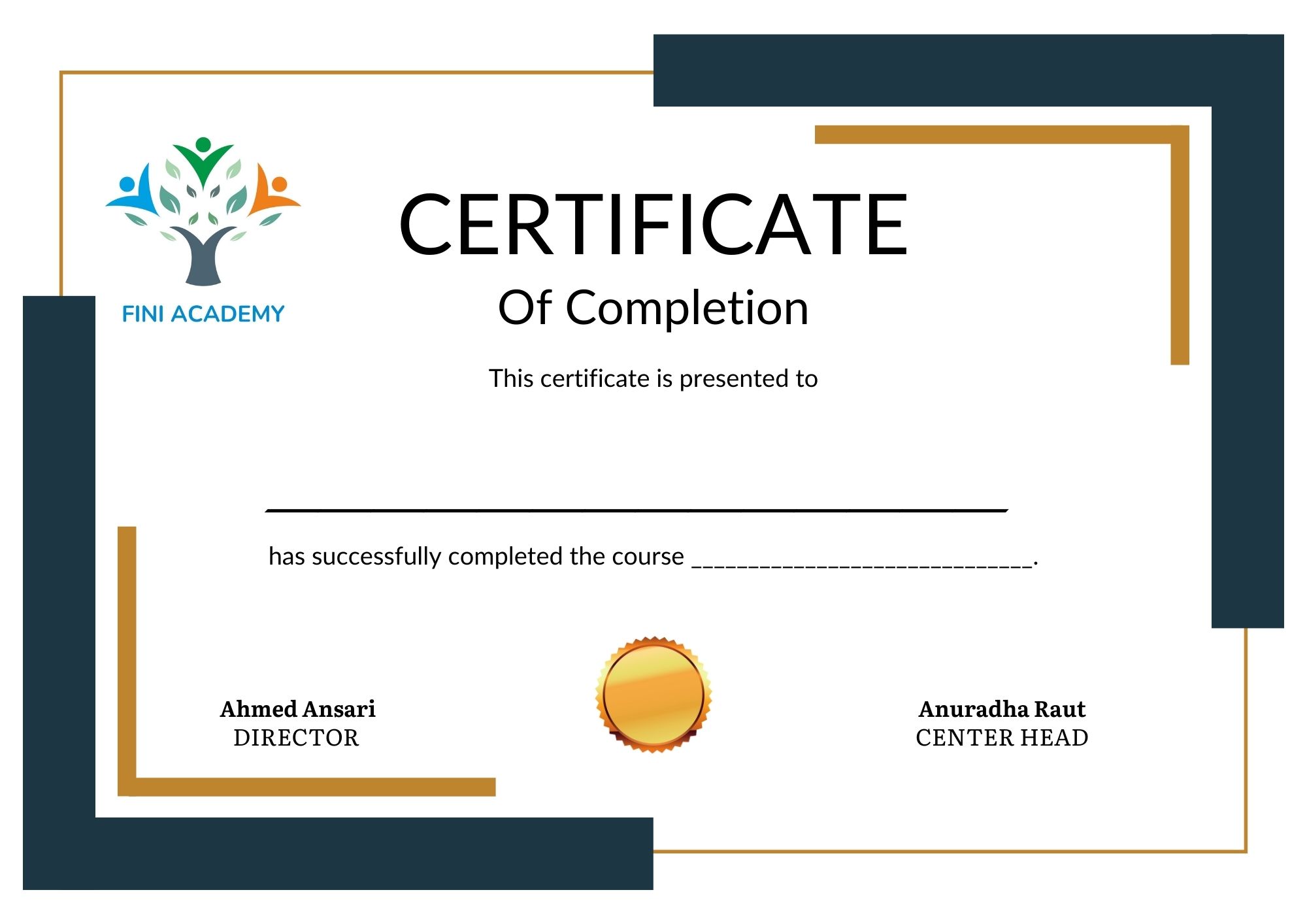- +91 90280 94499
- info@finiacademy.com
- info.finiacademy@gmail.com
 An AWS course typically covers the fundamentals of cloud computing, including core AWS services like EC2 for compute, S3 for storage, and RDS for databases. You'll learn about security and identity management with IAM, deployment and automation tools like CloudFormation, and cost management practices. Hands-on labs provide practical experience in building and deploying applications on AWS, and advanced topics may include big data, machine learning, and serverless architectures.
An AWS course typically covers the fundamentals of cloud computing, including core AWS services like EC2 for compute, S3 for storage, and RDS for databases. You'll learn about security and identity management with IAM, deployment and automation tools like CloudFormation, and cost management practices. Hands-on labs provide practical experience in building and deploying applications on AWS, and advanced topics may include big data, machine learning, and serverless architectures.
The objective of the AWS Course is to provide participants with the essential skills to design, deploy, and manage secure, scalable cloud solutions using AWS. The course covers key services like EC2, S3, RDS, and Lambda, along with cloud security, networking, and cost optimization. It prepares learners for AWS certifications and equips them with practical experience in managing and optimizing AWS environments
The AWS Course offers a comprehensive introduction to cloud computing with Amazon Web Services.
Module 1: Getting Started with AWS
 Cloud Computing
Cloud Computing Types of Cloud Computing Services
Types of Cloud Computing Services Cloud Service Models
Cloud Service Models Characteristic of Cloud
Characteristic of Cloud Region & Availability Zones
Region & Availability Zones AWS Global Infrastructure Map
AWS Global Infrastructure MapModule 2: Identity and Access Management – IAM
 User & Group
User & Group Permissions
Permissions Policy Inheritance
Policy Inheritance Password Policy
Password Policy Multi Factor Authentication
Multi Factor Authentication MFA device option
MFA device option AWS CLI & SDK
AWS CLI & SDK Roles for Services
Roles for Services Security Tools
Security ToolsModule 3: Elastic Compute Cloud – EC2
 Amazon EC2
Amazon EC2 Sizing and configuration options
Sizing and configuration options User data
User data Characteristics
Characteristics Instance type Overview
Instance type Overview Security Group
Security Group Instance purchase option
Instance purchase optionModule 4: Elastic Compute Cloud – Associate
 Private vs Public IP (IPv4)
Private vs Public IP (IPv4) Fundamental Difference
Fundamental Difference Elastic IP
Elastic IP Placement group
Placement group Elastic Network Interface – ENI
Elastic Network Interface – ENI EC2 Hibernate
EC2 HibernateModule 5: EC2 – Instance Storage Section
 EBS Volume
EBS Volume EC2 Instance Storage
EC2 Instance Storage EBS Volume type
EBS Volume type EBS Multi attachEBS Encryption
EBS Multi attachEBS Encryption Amazon Machine Image – AMI
Amazon Machine Image – AMI Amazon EFS – Elastic File System
Amazon EFS – Elastic File System Performance & Storage Classes
Performance & Storage Classes EBS vs EFS
EBS vs EFSModule 6: AWS Fundamentals – Load Balancer, Auto Scaling Group
 Scalability & High Availability
Scalability & High Availability Load Balancer – Elastic Load Balancer
Load Balancer – Elastic Load Balancer Health Check
Health Check Types of Load Balancer
Types of Load Balancer Load Balancer Security Group
Load Balancer Security Group Sticky Session (Session Affinity)
Sticky Session (Session Affinity) Cross Zones Load Balancing
Cross Zones Load Balancing SSL Certificates
SSL Certificates SSL – Server Name Indication – SNI
SSL – Server Name Indication – SNI Connection Draining
Connection Draining Auto Scaling Group – ASG
Auto Scaling Group – ASG ASG with Load Balancer
ASG with Load Balancer ASG Attributes
ASG Attributes ASG – CloudWatch Alarm & Scaling
ASG – CloudWatch Alarm & Scaling ASG- Dynamic Scaling Policies
ASG- Dynamic Scaling Policies ASG – Predictive Scaling
ASG – Predictive Scaling Scaling Cooldowns
Scaling CooldownsModule 7: Relational Database Service – RDS, Aurora & ElastiCache
 RDS Overview
RDS Overview Advantages of RDS
Advantages of RDS RDS Backup
RDS Backup RDS – Auto Scaling
RDS – Auto Scaling RDS – Read Replica
RDS – Read Replica RDS – Read Replica Use Cases
RDS – Read Replica Use Cases RDS – Read Replica Network Cost
RDS – Read Replica Network Cost RDS Multi AZs – Disaster Recovery
RDS Multi AZs – Disaster Recovery RDS – Single AZ to Multi AZ
RDS – Single AZ to Multi AZ RDS Custom
RDS Custom RDS Security – Encryption
RDS Security – Encryption RDS Security – Network & IAM
RDS Security – Network & IAM Amazon Aurora
Amazon Aurora Aurora High Availability and Read Replica
Aurora High Availability and Read Replica Features of Aurora
Features of Aurora Aurora Security
Aurora Security ElastiCache Overview
ElastiCache Overview ElastiCache Solution Architecture – DB Cache
ElastiCache Solution Architecture – DB Cache ElastiCache Solution Architecture – User Session Store
ElastiCache Solution Architecture – User Session Store ElastiCache – Redis & Memcached
ElastiCache – Redis & MemcachedModule 8: Route 53
 What is DNS?
What is DNS? DNS Terminologies
DNS Terminologies How DNS works
How DNS works Amazon Route 53
Amazon Route 53 Records
Records Hosted Zones
Hosted Zones Records TTL (Time to Live)
Records TTL (Time to Live) CNAME vs Alias
CNAME vs Alias Alias Records
Alias Records Alias Record Target
Alias Record Target Routing Policies
Routing Policies Health Check
Health Check Monitor an Endpoint
Monitor an Endpoint Calculated health check
Calculated health check Domain Registrar vs DNS Service
Domain Registrar vs DNS Service 3rdparty registrar with Amazon route 53
3rdparty registrar with Amazon route 53Module 9: Elastic BeanStalk
 Typical architecture – Web App 3-tier
Typical architecture – Web App 3-tier Developer problem
Developer problem Elastic BeanStalk Overview
Elastic BeanStalk Overview Component
Component Supported Platform
Supported Platform Web Server tier vs Worker tier
Web Server tier vs Worker tierModule 10: Amazon S3
 Simple Storage Service – S3
Simple Storage Service – S3 Use cases
Use cases Buckets
Buckets Objects
Objects Versioning
Versioning Object Encryption
Object Encryption Security
Security Bucket Policies
Bucket Policies Block Public Access
Block Public Access Security – Others
Security – Others Static Website Hosting
Static Website Hosting MFA Delete
MFA Delete Access Logs
Access Logs Replication (CRR & SRR)
Replication (CRR & SRR) Pre-Signed URLs
Pre-Signed URLs S3 Storage Classes
S3 Storage Classes Durability & Availability
Durability & Availability Price Comparison
Price Comparison Amazon S3 Advanced
Amazon S3 Advanced Moving between storage classes
Moving between storage classes Lifecycle Rules
Lifecycle Rules S3 Analytics
S3 Analytics Baseline Performance
Baseline PerformanceModule 11: Global Infrastructure – CloudFront & Global Accelerator
 Amazon CloudFront
Amazon CloudFront CloudFront – Origin
CloudFront – Origin CloudFront at a High level
CloudFront at a High level S3 as an Origin
S3 as an Origin CloudFront Geo Restriction
CloudFront Geo Restriction CloudFront vs S3 Cross Region Replication
CloudFront vs S3 Cross Region Replication CloudFront – Pricing
CloudFront – Pricing Global users for our application
Global users for our application Unicast IP vs Anycast IP
Unicast IP vs Anycast IP AWS Global Accelerator
AWS Global Accelerator Global Accelerator vs CloudFront
Global Accelerator vs CloudFrontModule 12: AWS Integration & Messaging
 Amazon SNS
Amazon SNS SNS integration with AWS Services
SNS integration with AWS Services SNS – How to Publish
SNS – How to Publish SNS – Security
SNS – SecurityModule 13: Serverless
 Serverless Overview
Serverless Overview Serverless in AWS
Serverless in AWS AWS Lambda
AWS Lambda Benefits of AWS Lambda
Benefits of AWS Lambda Lambda language support
Lambda language support Lambda Integration with AWS Services
Lambda Integration with AWS Services Lambda – Pricing
Lambda – Pricing Lambda Limitation – Per Region
Lambda Limitation – Per RegionModule 14: Virtual Private Cloud – VPC
 VPC Component Diagram
VPC Component Diagram CIDR – IPv4
CIDR – IPv4 CIDR – Subnet mask
CIDR – Subnet mask Public vs Private IP (IPv4)
Public vs Private IP (IPv4) Default VPC
Default VPC VPC Overview
VPC Overview Subnets
Subnets Internet Gateway – IGW
Internet Gateway – IGW Routing Table
Routing Table Bastion Host (Jump Server)
Bastion Host (Jump Server) NAT Instance
NAT Instance NAT Gateway
NAT Gateway NAT Gateway vs NAT Instance
NAT Gateway vs NAT Instance Security Group & NACLs
Security Group & NACLs Default NACLs
Default NACLs Ephemeral Ports
Ephemeral Ports NACL with Ephemeral Ports
NACL with Ephemeral Ports Security Group vs NACLs
Security Group vs NACLs VPC Peering
VPC Peering VPC Endpoints
VPC Endpoints Types of Endpoints
Types of Endpoints VPC – Flow Logs
VPC – Flow Logs AWS Site to Site VPN
AWS Site to Site VPN AWS VPN CloudHub
AWS VPN CloudHub Direct Connect – DX
Direct Connect – DX Direct Connect Gateway
Direct Connect Gateway Direct Connect – Encryption
Direct Connect – Encryption Transit Gateway
Transit Gateway Transit Gateway – Site to Site VPN ECMP
Transit Gateway – Site to Site VPN ECMP Transit Gateway – throughput with ECMP
Transit Gateway – throughput with ECMP Direct Connect between Multiple accounts
Direct Connect between Multiple accountsModule 15: AWS Monitoring, Audit & Performance
 Amazon CloudWatch Metrics
Amazon CloudWatch Metrics EC2 Detailed Monitoring
EC2 Detailed Monitoring AWS CloudTrail
AWS CloudTrail CloudTrail Events
CloudTrail Events CloudTrail Events Retention
CloudTrail Events RetentionModule 16: Container Section
 What is Docker?
What is Docker? Docker on an OS
Docker on an OS Docker vs Virtual Machines
Docker vs Virtual Machines Getting Started with Docker
Getting Started with Docker Docker Container Management on AWS
Docker Container Management on AWS Amazon ECS – EC2 Launch Type
Amazon ECS – EC2 Launch Type Amazon ECS – Fargate Launch Type
Amazon ECS – Fargate Launch Type IAM Roles for ECS
IAM Roles for ECS Amazon ECS – Load Balancer Integrations
Amazon ECS – Load Balancer Integrations Amazon ECS – Data Volumes (EFS)
Amazon ECS – Data Volumes (EFS) ECS – Auto Scaling
ECS – Auto Scaling Amazon ECR
Amazon ECRTechnical Skills:
Teaching Skills:
Communication Skills:
Problem-Solving Skills:
Interpersonal Skills:
At FINI Academy, we understand that organizations need tailored training solutions to keep their teams competitive and up-to-date with the latest technological advancements. Our corporate training programs are designed to meet the unique needs of businesses, enhancing the skills of their workforce to drive innovation and efficiency.
We offer bespoke training programs that are specifically designed to align with your company’s goals and objectives. Our expert instructors work closely with you to understand your needs and develop a curriculum that addresses your specific challenges and requirements.
Industry-Relevant Curriculum Our training programs are crafted by industry experts and cover the latest trends, tools, and technologies. This ensures that your team acquires skills that are immediately applicable in the workplace.
Flexible Scheduling We offer flexible scheduling options to accommodate the busy calendars of your employees. Training sessions can be conducted at your premises, at our institute, or online, depending on what suits your organization best.
Hands-On Learning Our training emphasizes practical, hands-on learning experiences. Through real-world projects and case studies, participants gain valuable insights and the ability to apply what they’ve learned directly to their work.
Expert Instructors Our instructors are seasoned professionals with extensive industry experience. They bring practical knowledge and insights into the training sessions, making learning both engaging and impactful.
Continuous Support We provide ongoing support to ensure the success of your training initiatives. This includes post-training follow-ups, access to resources, and the availability of our instructors for any further guidance or clarification needed.
Every organization is different, and so are its training needs. Whether you are looking to upskill a small team or roll out a large-scale training initiative, we can tailor our programs to meet your specific requirements. We also offer the flexibility to focus on particular topics or technologies that are most relevant to your business.
Investing in your team’s development is crucial for staying competitive in today’s fast-paced tech landscape. Partner with FINI Academy to equip your employees with the skills they need to excel. For more information on our corporate training programs or to discuss your specific needs, please contact us at info@finiacademy.com, info.finiacademy@gmail.com or call 9028094499.
We look forward to working with you to achieve your training and development goals.
=> Our mission is to provide high-quality software training that equips students with the skills needed to excel in the tech industry.
2. Where is the institute located?=> We are located at Shop no. 2s1-16, 1st floor, konark indrayu, above HDFC bank, Meeta Nagar, Kondhwa, Pune, Maharashtra 411048. You can find detailed directions on our Contact Us page.
3. What courses do you offer?=> We offer a variety of courses including web development, data science, machine learning, mobile app development, and more. Check our Courses page for a full list.
4. What is the duration of each course?=> Course durations vary. Most of our courses range from 4 to 12 weeks. Please refer to the specific course details for more information.
5. Are the courses online or in-person?=> We offer both online and in-person courses to accommodate different learning preferences and schedules.
6. What are the prerequisites for enrolling in a course?=> Prerequisites vary by course. Some courses require basic programming knowledge, while others are designed for beginners. Please check the course details for specific requirements.
7. How do I enroll in a course?=> You can enroll in a course by visiting our website, selecting your desired course, and following the enrollment instructions. Alternatively, you can contact our admissions office for assistance.
8. What is the admission process?=> The admission process typically involves filling out an application form, meeting any prerequisites, and making a payment to secure your spot. Some advanced courses may require an interview or assessment.
9.Who are the instructors?=> Our instructors are industry professionals with extensive experience in their respective fields. You can read more about our instructors on our Faculty page.
10. What materials are provided for the course?=> Course materials, including lecture notes, assignments, and software tools, will be provided. Some courses may require additional textbooks or resources, which will be specified in the course details.
11. Will I receive a certificate upon completion?=> Yes, you will receive a certificate upon successful completion of the course.
12. Is there job placement assistance after completing the course?=> We offer job placement assistance, including resume workshops, interview preparation, and connections to our network of industry partners.
13. Can I retake a course if I don’t pass?=> Yes, we allow students to retake courses. Please contact our admissions office for details on retake policies and fees.
14. What should I do if I encounter technical issues during an online course?=> For technical support, IT support team always help during this period. We are available to assist you during business hours.
15. How can I contact the institute for more information?=> You can reach us via email at , , by phone at 9028094499, or through our Contact Us page.
16. What are the office hours?=> Our office hours are Monday to Saturday , 9 AM to 6 PM.
At FINI Academy, we strive to offer flexible and convenient scheduling to accommodate the diverse needs of our students. Our courses are designed to provide a balance between comprehensive learning and manageable time commitments.
We are committed to providing high-quality education and are always available to assist you in selecting the course and schedule that best fits your needs.
Curriculum Development:
Training Delivery:
Technical Expertise:
Assessment and Feedback:
Mentorship and Support:
Continuous Learning:
At FINI Academy, we value the feedback of our students as it helps us to continuously improve and maintain the high standards of our training programs. Below are some general insights based on student experiences:
Course Content Our students appreciate the comprehensive and up-to-date curriculum that aligns with current industry standards. The blend of theoretical knowledge and practical application ensures that participants are well-prepared for real-world challenges.
Instructors Students consistently praise our instructors for their expertise, approachability, and dedication. Our instructors are industry professionals who bring valuable real-world insights to the classroom, enhancing the learning experience.
Learning Environment Both our online and in-person classes are designed to be interactive and engaging. Students have highlighted the supportive and collaborative atmosphere that fosters effective learning.
Course Materials The provided course materials, including lecture notes, assignments, and resources, are well-received for their clarity and relevance. Students find these materials instrumental in reinforcing their learning and aiding in the application of concepts.
Support Services Our support services, including technical assistance and career guidance, are highly valued by students. The availability of job placement assistance and resume workshops has been particularly beneficial for those seeking to advance their careers.
Flexibility The flexible scheduling options are appreciated by students who are balancing their studies with other commitments. The ability to choose between online and in-person classes offers added convenience.
Overall Satisfaction Overall, students express a high level of satisfaction with our courses. Many have noted significant improvements in their skills and career prospects following the completion of our programs.
We are grateful for the positive feedback and are committed to continually enhancing our offerings based on student input. We invite prospective students to join us and experience firsthand the quality education that FINI Academy provides.


Full stack WEB development is the process of developing both the frontend and backend of applications. Any application has a frontend (user-facing) component and a backend (database and logic) component.

A full-stack Java developer is a web programmer who uses Java, a popular computer programming language. Three layers of application: front-end, back-end and database layer.

DevOps is the combination of practices and tools designed to increase an organization's ability to deliver applications and services faster than traditional software development processes.